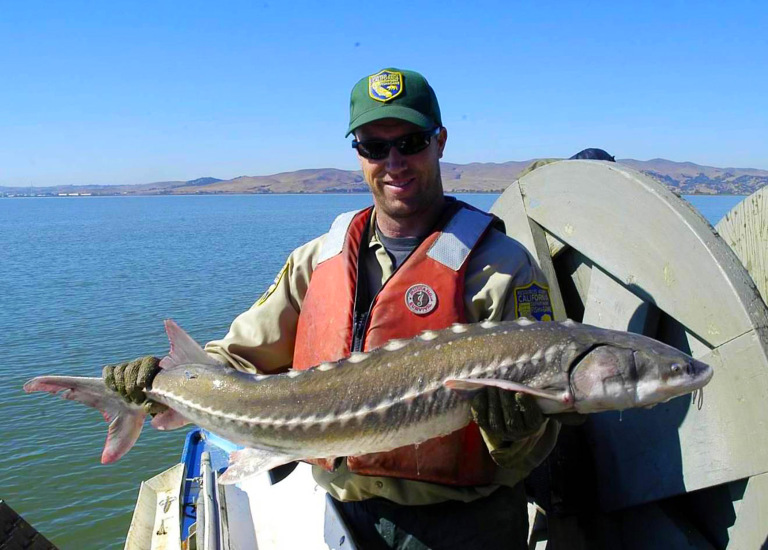
Targeting Stripers and Sturgeon together in San Francisco Bay

by Carrie Wilson
7-14-2017
Website
Question: When fishing from a boat in San Francisco Bay, can some anglers target striped bass with barbed hooks while others target sturgeon using barbless hooks? If one angler who is fishing from a boat with a barbless hook legally lands and retains a sturgeon, can all anglers on the boat switch over to target striped bass and continue to use barbed hooks? (Craig. H.)
Answer: There is no regulation that requires all persons fishing aboard a vessel with a sturgeon on board to use barbless hooks. However, the definition of “take” may get anglers in trouble if they are observed fishing in a manner consistent with those methods used to “take” sturgeon. “Take” is defined as “to hunt, pursue, catch, capture or kill, or attempt to hunt, pursue, catch, capture or kill” (Fish and Game Code, section 86). Game wardens are watching out for people who may be attempting to take sturgeon with barbed hooks, or are trying to circumvent the requirement to purchase a sturgeon report card by saying they are “just striper fishing.” So, be sure that there is no ambiguity over what you are targeting to avoid any questions of intent.
Mouth calls for deer?
Question: My question is regarding deer season. I am wondering if it is ok to use mouth calls for deer hunting here in California. I have found this legal to do in other states but have not heard it mentioned one way or the other here in this state. (Richard T.)
Answer: Yes, you can use mouth calls for deer as long as the sounds are not electronically generated or electronically amplified (Fish and Game Code, section 3012).
Where to fish loop crab snares?
Question: Are there restrictions on where loop crab snares (used with fishing poles) in California can be used? I fish in the southern and central management areas. (Ted B., Oxnard)
Answer: “Crab traps, including crab loop traps, may be used north of Point Arguello, Santa Barbara County, to take all species of crabs….” (CCR Title 14, section 29.80(e)). Make sure the area you’d like to fish is not a Marine Protected Area where take is not allowed.
Marine invertebrates for personal collections
Question: I am a marine biology student who wants to have a simple native “tide pool” type of aquarium for my own personal delight. I have had a tropical salt water reef ecosystem in my home for years but I am also interested in a local cold water reef system. I live in the Orange County area of Southern California and am wondering if it is possible to collect for a non-scientific reason, and if so, what do I need to do? What are the explicit regulations concerning the collection of live marine organisms for use in a personal marine aquarium? From what I understand, live fish are not to be taken under any circumstances. But I am interested in collecting octopus, and it seems that some organisms are allowed as long as they do not come from a protected area. I do have a California sport fishing license. (Cristiana A.)
Answer: Octopus may be collected for a home aquarium and transported live under the authority of a sport fishing license as long as they are exclusively for that person’s personal aquarium display. Maintaining live sport-taken octopus in a home aquarium is not considered public “display” and thus does not fall under the provisions of the marine aquaria pet trade (FGC, sections 8596-8597). Transporting live “finfish” (as opposed to mollusks and crustaceans) is prohibited (CCR Title 14, section 1.62).
Invertebrates collected under the authority of a sport fishing license may not be used to establish breeding colonies for sale or trade with other people. Any trading, selling or possession for sale or trade of these animals constitutes commercial marine aquaria pet trade activity and requires all parties to hold “marine aquaria collectors permits” authorizing this practice. A marine collector’s permit is also required for any animals on display for the public.
People collecting live marine invertebrates for a home aquarium may do so only under the authority of a sport fishing license, and only those species allowed under a sport fishing license may be taken. In addition, any species with sport fishing restrictions (bag, size, possession or season limits, methods of take, etc.) are still covered under those regulations, so collectors must also abide by these laws.
Carrie Wilson is a marine environmental scientist with the California Department of Fish and Wildlife. While she cannot personally answer everyone’s questions, she will select a few to answer each week in this column. Please contact her at CalOutdoors@wildlife.ca.gov.
Website Hosting and Design provided by TECK.net